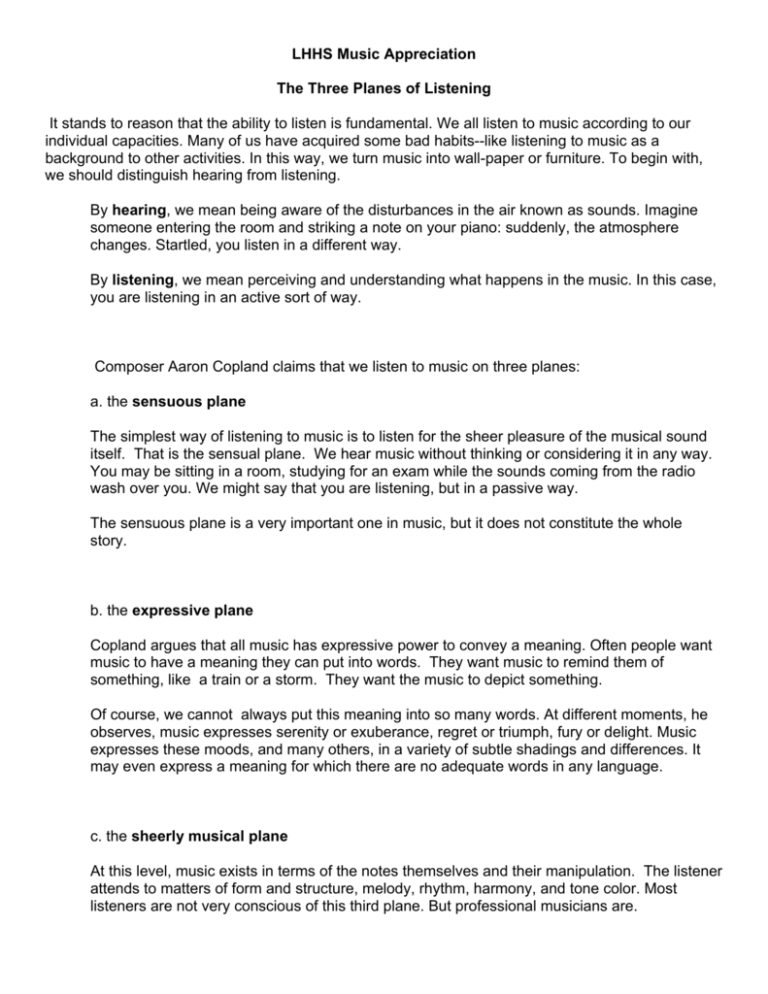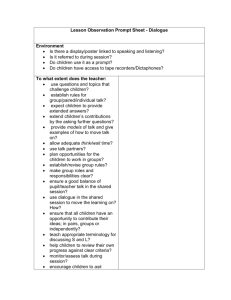LHHS Music Appreciation The Three Planes of Listening It stands to
advertisement

LHHS Music Appreciation The Three Planes of Listening It stands to reason that the ability to listen is fundamental. We all listen to music according to our individual capacities. Many of us have acquired some bad habits--like listening to music as a background to other activities. In this way, we turn music into wall-paper or furniture. To begin with, we should distinguish hearing from listening. By hearing, we mean being aware of the disturbances in the air known as sounds. Imagine someone entering the room and striking a note on your piano: suddenly, the atmosphere changes. Startled, you listen in a different way. By listening, we mean perceiving and understanding what happens in the music. In this case, you are listening in an active sort of way. Composer Aaron Copland claims that we listen to music on three planes: a. the sensuous plane The simplest way of listening to music is to listen for the sheer pleasure of the musical sound itself. That is the sensual plane. We hear music without thinking or considering it in any way. You may be sitting in a room, studying for an exam while the sounds coming from the radio wash over you. We might say that you are listening, but in a passive way. The sensuous plane is a very important one in music, but it does not constitute the whole story. b. the expressive plane Copland argues that all music has expressive power to convey a meaning. Often people want music to have a meaning they can put into words. They want music to remind them of something, like a train or a storm. They want the music to depict something. Of course, we cannot always put this meaning into so many words. At different moments, he observes, music expresses serenity or exuberance, regret or triumph, fury or delight. Music expresses these moods, and many others, in a variety of subtle shadings and differences. It may even express a meaning for which there are no adequate words in any language. c. the sheerly musical plane At this level, music exists in terms of the notes themselves and their manipulation. The listener attends to matters of form and structure, melody, rhythm, harmony, and tone color. Most listeners are not very conscious of this third plane. But professional musicians are. To make these three planes clearer, an analogy will help. Think about what happens when we go to a football game. At the game, we are aware of the players, the setting, the uniforms, the movements, the sounds, and so on. All these elements give one a sense that the game is an exciting place to be. They constitute the sensuous plane. The expressive plane in the game would be derived from the feeling that you get from what is happening on the field. In our reactions we are moved to excitement, joy, anger, sadness, and so on. It is the general feeling and emotional “something” that exists in a game that can explain the expressive quality in music. The plays and development of the game is equivalent to our sheerly musical plane. The coaches and players create the drama and develop a plan, creating the game. According to the degree of your awareness of the fine points of the game, you become the more intelligent fan. The enthusiastic sports fan is never conscious of any of these elements separately, but is aware of them all at the same time. The same is true of music listening. We simultaneously and without thinking listen on all three planes. In a sense, the ideal listener is both inside and outside the music at the same moment, judging it and enjoying it, wishing it would go one way and watching it go another. What you should strive for, then is a more active kind of listening. Whether you listen to Mozart or Motley Crue, you can deepen your understanding of music only by being a more conscious and aware listener, not someone who is just listening but someone who is listening for something. What kind of a listener are you?




